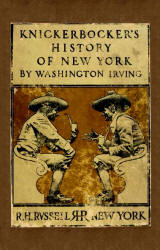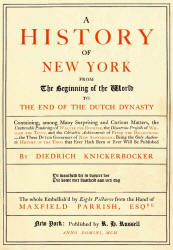Knickerbocker's History of New York
(1900)
Illustrated by Maxfield Parrish
To the left, we show a copy of
Knickerbocker's History of New York , as
illustrated by Maxfield Parrish and published by
R H Russell (New York)
in 1900.
This example retains the original
brown board cover with applied
illustrated paste-down.
On the right, we show the
Title
Page to this 1st Edition.
Knickerbocker's History of New York (1900) is the 1st Edition of
Washington Irving's collection of stories to include illustrations
by Maxfield Parrish.
In Irving's introduction to the work, entitled,
"The Author's Apology " , he provides his own prelude to the book,
which
had been originally been styled, "A History of New
York: From the Beginning of the World to the End of the Dutch
Dynasty" - written by the fictitious author, Diedrich
Knickerbocker.
Parrish's illustrations complement the parody within
Irving's text in a wonderful manner.
Our Greeting Cards and Reproduction Prints
We have prepared sets of 8 Greeting Cards displaying
each of the major monotone images from Knickerbocker's History of New York (1900) and on the left, we show an example of how these Greeting
Cards appear. Ordering one of those sets is as easy as selecting the "Add to
Cart" feature below and following the prompts provided with our Shopping Cart
secured through PayPal. Multiple purchases will
be consolidated by that feature and shipping and handling costs to any destination in the world are accommodated by our flat-rate fee of US$20 for every
US$200 worth of purchases.
Code: MP
KHNY MS(8)Price: US$40.00
When presented on Greeting Cards, these
images are prepared as tipped-on
plates - in hommage to the hand-crafted
approach typical
of prestige illustrated publications produced in the early decades
of the 20th Century.
Hand-finishing is used to replicate the
visual appearance of a tipped-on plate and the images are presented
on
Ivory card stock (in the case of colour illustrations) or White
card stock (in the case of monotone illustrations)
with an accompanying envelope. We have left the cards blank so that you may write your own personal
message.
Should you wish to order a Reproduction Print or an
individual Greeting Card from this suite of images, we have
provided options below. Of course, should you require a customised preparation, we welcome
your contact through
ThePeople@SpiritoftheAges.com
In the meantime, enjoy perusing these wonderful images
from Maxfield Parrish.
The major monotone illustrations
Book I
Chapter V
They introduced among them
rum, gin,
and brandy, and the other
comforts
of life ...
Book II
Chapter II
Saint
Nicholas
Book II
Chapter V
And Oloffe bethought him, and
he hastened
and climbed up to the top of one
of the tallest
trees, and saw that the smoke
spread over a
great extent of country; and, as
he considered
it more attentively, he fancied
that the great
volume of smoke assumed a
variety of
marvellous forms, where in dim
obscurity he
saw shadowed out places and
domes and
lofty spires
(Frontispiece)
Book III
Chapter I
The morning after he had been
installed in
office, and at the moment that
he was making
his breakfast from a prodigious
earthen dish,
filled with milk and Indian
pudding, he was
interrupted by the appearance of
Wandle
Schoonhoven, a very important
old burgher
of New Amsterdam
Reproduction on 12x18" sheet
Code: MP KHNY M1 12x18Price: US$60.00
Reproduction on 12x18" sheet
Code: MP KHNY M2 12x18Price: US$60.00
Reproduction on 12x18" sheet
Code: MP KHNY M3 12x18Price: US$60.00
Reproduction on 12x18" sheet
Code: MP KHNY M4 12x18Price: US$60.00
Book IV
Chapter VII
Blacksmiths ... suffered their
own fires to
go out, while they blew the
bellows and
stirred up the fires of faction
Book V
Chapter VIII
Concerning witchcraft
Book VI
Chapter VIII
A phalanx of oyster-fed
Pavonians ... who
had remained behind to digest
the enormous
dinner they had eaten
Book VII
Chapter IX
The first movement of the
governor ...
was to mount to the roof, whence
he
contemplated with rueful aspect
the
hostile squadron
Reproduction on 12x18" sheet
Code: MP KHNY M5 12x18Price: US$60.00
Reproduction on 12x18" sheet
Code: MP KHNY M6 12x18Price: US$60.00
Reproduction on 12x18" sheet
Code: MP KHNY M7 12x18Price: US$60.00
Reproduction on 12x18" sheet
Code: MP KHNY M8 12x18Price: US$60.00
Return to top
Washington Irving's introduction to Knickerbocker's History of New York ,
entitled, ''The Author's Apology''
The following work, in which, at the outset, nothing
more was contemplated than a temporary jeu d'esprit , was commenced
in company with my brother, the late Peter Irvin, Esq.
Our idea was, to parody a small hand-book which had recently
appeared, entitled A Picture of New York . Like
that, our work was to begin with an historical sketch, to be followed by
notices of the customs, manners and institutions of the
city, written in a serio-comic vein, and treating local errors, follies,
and abuses with good-humored satire.
To burlesque the pedantic lore displayed in certain
American works, our historical sketch was to commence with the
creation of the world; and we laid all kinds of works
under contribution for trite citations, relevant or irrelevant, to give
it the proper air of learned research. Before this
crude mass of mock erudition could be digested into form, my brother
departed for Europe, and I was left to prosecute the
enterprise alone.
I now altered the plan of the work. Discarding all idea
of a parody on the Picture of New York , I determined that what
had been originally intended as an introductory sketch
should comprise the whole work, and a form a comic history of the
city. I accordingly moulded the mass of citations and
disquisitions into introductory chapters, forming the first book; but it
soon became evident to me that, like Robinson Crusoe
with his boat, I had begun on too large a scale, and that, to launch
my history successfully, I must reduce its proportions.
I accordingly resolved to confine it to the period of the Dutch
domination, which, in its rise, progress, and decline,
presented that unity of subject required by classic rule. It was a period,
also, at that time almost a terra incognita in
history. In fact, I was surprised to find how few of my fellow-citizens were
aware that New York had ever been called New Amsterdam,
or had heard of the names of its early Dutch governors, or
cared a straw about their ancient Dutch progenitors.
This, then, broke upon me as the poetic age of our city
- poetic from its very obscurity; and open, like the early and
obscure days of ancient Rome, to all the embellishments
of heroic fiction. I hailed my native city as fortunate above all
other American cities, in having an antiquity thus
extending back into the regions of doubt and fable; neither did I conceive
I was committing any grievous historical sin in helping
out the few facts I could collect in this remote and forgotten region
with figments of my own brain, or in giving
characteristic attributes to the few names connected with it which I might dig
up from oblivion.
In this, doubtless, I reasoned like a young and
inexperienced writer besotted with his own fancies; and my presumptuous
trespasses into this sacred though neglected region of
history have met with deserved rebuke from men of soberer minds. It
is too late, however, to recall the shaft thus rashly
launched. To any one whose sense of fitness i may wound, I can only
say with Hamlet:
Let my disclaiming from a purposed evil
Free me so far in your most generous thoughts,
That I have shot my arrow o'er the house,
And hurt my brother.
I will say this in further apology or my work: that, if
it has taken an unwarrantable liberty with our early provincial history,
it has at least turned attention to that history and
provoked research. It is only since this work appeared that the forgotten
archives of the province have been rummaged, and the
facts and personages of the olden time rescued from the dust of
oblivion and elevated into whatever importance they may
virtually possess.
The main object of my work, in fact, had a bearing wide
from the sober aim of history; but one which, I trust, will meet
with some indulgence from poetic minds. It was to
embody the traditions of our city in an amusing form; to illustrate its
local humors, customs, and peculiarities; to clothe
home scenes and places and familiar names with those imaginative and
whimsical associations so seldom met with in our new
country, but which live like charms and spells about the cities of the
old world, binding the heart of the native inhabitant
to his home.
In this I have reason to believe I have in some measure
succeeded. Before the appearance of my work the popular
traditions of our city were unrecorded; the peculiar
and racy customs and usages derived from our Dutch progenitors were
unnoticed, or regarded with indifference, or adverted
to with a sneer. Now they form a convivial currency, and are
brought forward on all occasions; they link our whole
community together in good humor and good fellowship; they are
the rallying points of home feeling, the seasoning of
our civic festivities, the staple of local tales and local pleasantries, and
are so harped upon by our writers of popular fiction
that I find myself almost crowded off the legendary ground which I
was the first to explore, by the host who have followed
in my footsteps.
I dwell on this head, because, at the first appearance
of my work, its aim and drift were misapprehended by some of the
descendants of the Dutch worthies, and because I
understand that now and then one may still be found to regard it with a
captious eye. The far greater part, however, I have
reason to flatter myself, receive my good-humored picturings in the
same temper in which they were executed; and when I
find, after a lapse of nearly forty years, this hap-hazard production
of my youth still cherished among them - when I find
its very name become a "household word" and used to give the
home stamp to everything recommended for popular
acceptation, such as Knickerbocker societies, Knickerbocker insurance
companies, Knickerbockers steamboats, Knickerbocker
omnibuses, Knickerbocker bread, and Knickerbocker ice; and when I
find New Yorkers of Dutch descent priding themselves
upon being "genuine Knickerbockers" - I please myself with the
persuasion that I have struck the right chord; that my
dealings with the good old Dutch times, and the customs and usages
derived from them, are in harmony with the feelings and
humors of my townsmen; that I have opened a vein of pleasant
associations and quaint characteristics peculiar to my
native place, and which its inhabitants will not willingly suffer to pass
away; and that, though other histories of New York may
appear of higher claims to learned acceptation, and may take
their dignified and appropriate rank in the family
library, Knickerbocker's history will still be received with good-humored
indulgence, and be thumbed and chuckled over by the
family fireside.
Return to top


%20(card)%20(sample).jpg)
.jpg)
.jpg)
.jpg)
.jpg)
.jpg)
.jpg)
.jpg)
.jpg)